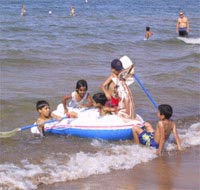Health and Environmental Effects Research
National Epidemiological and Environmental Assessment of Recreational Water
Basic Information

|
Recreational water can be a breeding ground for a variety of human pathogens. Over the past 50 years, epidemiological (dealing with the transmission and control of disease) studies, as well as outbreaks, have linked swimming in polluted water with human health effects. Swimming in unsafe water may result in minor illnesses, such as sore throats or diarrhea.
The U.S. Environmental Protection Agency established current water quality guidelines for the regulation of marine and fresh recreational waters in 1986. These guidelines were developed based on large-scale studies of swimmers' health conducted in the 1970s. However, because the types of tests recommended by the guidelines require at least 24 hours for results, they are often considered insufficient to make beach managerial decisions.
Recent technological developments now give the opportunity to improve beach monitoring information utilizing near real-time monitoring results, appropriate sampling plans, and meaningful risk-based guidelines. These new ways of measuring water pollution, however, have not yet been studied in relationship with human health.
To address this, the U.S. Environmental Protection Agency is conducting epidemiological studies that are part of a multi-phase project addressing environmental risks to beachgoers. The NEEAR study is an important part of the U.S. EPA's BEACH program. The BEACH Program aims to protect the health of beachgoers through assistance to state, tribal, and local health and environmental officials in designing, developing and implementing beach monitoring and advisory programs and by providing the public with information about the risks associated with swimming in contaminated water. More information about the BEACH program can be found at https://www.epa.gov/waterscience/beaches/2000/introduction.html
